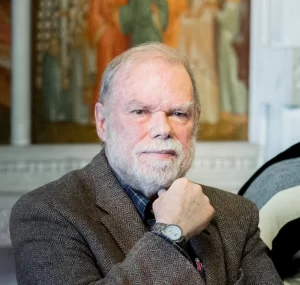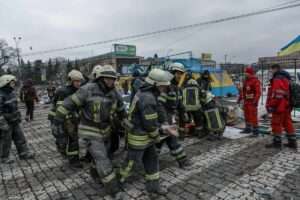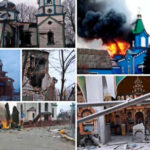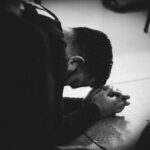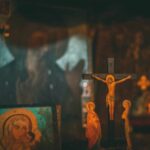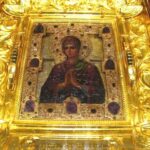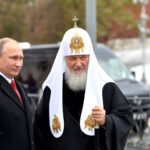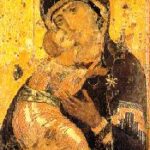Hate Breeds Hate
By Archbishop Lazar (Puhalo)
Asullen, somber young man goes to a gun store in Virginia, where he will have no difficulty purchasing handguns. He is seriously mentally ill and many people around him are aware of it, but no one has succeeded in placing him under professional care; perhaps no one has tried. The clerk at the gun store has no obligation to know whether or not the man is mentally ill. There is no program for assessing who may buy a handgun. The only real requirement is that the buyer be at least eighteen years of age. A while later, the young man has massacred more than thirty classmates and teachers, then committed suicide.
The first thing that stands out among the details of this matter is how many people knew that this young man was seriously ill and yet apparently did nothing about it. On the surface, it looks as if some people cared; but the fact is that of the dozens of people who say they knew, and of the several who were in positions of authority, it seems no one took any action to intervene in his situation. The demons in this young man's head were not of his own making. They only mirror the world of paranoia, fear and violence around him. His psychiatric condition inclined him to personalize all this.
His symptoms are well known. One should have expected some kind of violence from him, but perhaps no one looked carefully enough at him to be able to see it. We have twice had young men much like him show up at the monastery, and we got them into mental health care situations very quickly. I wonder how many tragedies might we would avoid if only we could open ourselves to the grace of God to be good Samaritans to the very troubled?
If we speculate about why things like this happen, it is often because human beings do not care enough about each other to prevent them from happening. In our society there is more to it than this, however. Violence has been given a value in culture and society. Television has made it graphic and the value given to it has made it difficult to distinguish heroes from anti-heroes. Victors in violent actions are noble, losers are evil, but there is little to distinguish them except which one won and which one lost. In the arena of actual warfare, it is only the losers who are guilty of war crimes, while the winners put them on trial, but in reality both committed atrocities, killed innocent civilians and wrought immense destruction.
Such episodes of personal violence as school and university mass murders can happen almost anywhere, but happen much more easily in the US because there is an almost idolatrous worship of guns. In the state of Virginia, one can own a rifle or shotgun at the age of twelve and one can legally purchase a handgun at the age of eighteen. How many people in those age ranges do you know whom you would want to have such weapons?
In a world and society which has in so many ways separated itself from God, it is difficult to ask "why does God allow...?" When many prominent religious leaders in the US are backing the death penalty, supporting war and even acting as advocates for the gun lobby, while almost openly hoping for Armageddon, practically reducing morality down to only sexual behavior, when the nation's leaders think that violence and sowing death and destruction is the way to handle conflicts, who is listening to God anyway?
Moreover, when many Orthodox Christians no longer observe those ordinary ascetic disciplines of Church life which God has given us to teach and exercise us in self-control, what should we expect of the rest of the world? Look at how many Orthodox Churches actually sponsor meals that violate the fasts, and do so in parish halls. Too many Orthodox Christians, those who are supposed to be the salt of the earth and the lights set upon lampstands for the rest of the world to see, do not take the Christian life seriously. They reduce the faith to some philosophical positions or customs, but have no desire to apply the living faith to life itself in a transforming way. And yet, without the ingredient of self-control and self-discipline, how can violence and injustice be avoided? If we, who claim to have the truth, the "faith once delivered," have no desire to learn or to teach our children self-discipline and self-control, what should we, then, expect of the world around us, or even of our own children?
How can we stop all this? We cannot avoid violence in this world. So long as Satan has the ear and heart of so many, we cannot stop it. We can pay more attention to each other and watch for symptoms in others that would alert us to the fact that they urgently need help, but we cannot stop violence in a fallen world in which violence itself appears to have value, a world in which we are taught by the example of national leaders and whole nations that violence is the solution to violence.
Stopping violence to a greater degree would require that we diligently search for root causes of the violence and seek, aided by prayer and fasting, for the Grace of the Holy Spirit to heal the root causes, not simply to bomb and shoot those whom we feel are responsible (we ourselves never are responsible, of course) for the violence. So long as nations and the leaders of nations deal with problems by resorting to violence and state terrorism, we have no reason to suspect that people who are mentally or emotionally unbalanced will not follow their example. Children tend to imitate adults, alas!
Prayer does have a healing power. We need to pray sincerely, and not just "because one is supposed to pray," for the healing of mankind, for the healing of our world, and we should not neglect to pray for the young man who committed this most recent massacre.
What else can we do? Let us begin by trying to recapture the meaning of our Orthodox Christian life, the actual meaning of the parish, to discover again the sweet mystery of the parish, how the parish itself is intended to promote the healing of the fallen human nature and our assimilation into the life in Christ.
Physically, the only thing we can do to protect ourselves is to be alert. We live in a world that is dangerous, and we need to be aware of that, to pray about it and to live our lives in such a way that we do not contribute to it. We place our hope in God for our own lives. We must make proper use of our Christian faith as a source of healing in the world, not as a source of judgment, division and enmity toward others.
The less we endorse violence, the more we observe the disciplines of Orthodox Christian life, the more we can contribute to love, peace and healing in the world around us. We do so need to learn to love "the other," those who are not "us" and not "like us."
How shall we, as Orthodox Christians, make such contributions to the world if we cannot have peace, harmony, self-control and self-discipline even in our own parishes, among neighboring parishes of the same jurisdiction and among the local national Orthodox Churches? Did our beloved father St. Paul not tell us that though we may speak with the tongues of men and of angels, know all mysteries and even give our bodies to be burned in martyrdom, but do not have love, we are only clanging brass and it does not profit us anything?
We must see the image of the creator in every other human being, not merely in those whom we see as being also an image of our own selves, those who agree with us and think and act as we do. The Church has even given us a program of prayer and fasting to help us accomplish this. If we do not strive to accomplish it, then we become part of the problem rather than the seed of healing in a troubled and suffering world.
Archbishop Lazar Puhalo is Civil Liaison for the Orthodox Church in America, Archdiocese of Canada. He is founder and abbot of the Monastery of All Saints of North America near Vancouver, Canada. He is educated in physics as well as theology, and lectures internationally on science and religion. He is Canadian secretary of the Orthodox Peace Fellowship and director of the Canadian Institute for Biblical and Patristic Studies. He is the author of more than 40 books.


